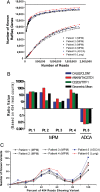Transcriptome sequencing of malignant pleural mesothelioma tumors
- PMID: 18303113
- PMCID: PMC2265129
- DOI: 10.1073/pnas.0712399105
Transcriptome sequencing of malignant pleural mesothelioma tumors
Abstract
Cancers arise by the gradual accumulation of mutations in multiple genes. We now use shotgun pyrosequencing to characterize RNA mutations and expression levels unique to malignant pleural mesotheliomas (MPMs) and not present in control tissues. On average, 266 Mb of cDNA were sequenced from each of four MPMs, from a control pulmonary adenocarcinoma (ADCA), and from normal lung tissue. Previously observed differences in MPM RNA expression levels were confirmed. Point mutations were identified by using criteria that require the presence of the mutation in at least four reads and in both cDNA strands and the absence of the mutation from sequence databases, normal adjacent tissues, and other controls. In the four MPMs, 15 nonsynonymous mutations were discovered: 7 were point mutations, 3 were deletions, 4 were exclusively expressed as a consequence of imputed epigenetic silencing, and 1 was putatively expressed as a consequence of RNA editing. Notably, each MPM had a different mutation profile, and no mutated gene was previously implicated in MPM. Of the seven point mutations, three were observed in at least one tumor from 49 other MPM patients. The mutations were in genes that could be causally related to cancer and included XRCC6, PDZK1IP1, ACTR1A, and AVEN.
Conflict of interest statement
The authors declare no conflict of interest.
Figures

Similar articles
-
Differentially expressed alternatively spliced genes in malignant pleural mesothelioma identified using massively parallel transcriptome sequencing.BMC Med Genet. 2009 Dec 31;10:149. doi: 10.1186/1471-2350-10-149. BMC Med Genet. 2009. PMID: 20043850 Free PMC article.
-
Inhibitor of apoptosis proteins are regulated by tumour necrosis factor-alpha in malignant pleural mesothelioma.J Pathol. 2007 Mar;211(4):439-46. doi: 10.1002/path.2120. J Pathol. 2007. PMID: 17253597
-
Epigenetic profiles distinguish malignant pleural mesothelioma from lung adenocarcinoma.Cancer Res. 2009 Dec 1;69(23):9073-82. doi: 10.1158/0008-5472.CAN-09-1595. Epub 2009 Nov 3. Cancer Res. 2009. PMID: 19887624
-
A review of transcriptome studies combined with data mining reveals novel potential markers of malignant pleural mesothelioma.Mutat Res. 2012 Apr-Jun;750(2):132-140. doi: 10.1016/j.mrrev.2011.12.003. Epub 2011 Dec 15. Mutat Res. 2012. PMID: 22198210 Review.
-
Molecular changes in mesothelioma with an impact on prognosis and treatment.Arch Pathol Lab Med. 2012 Mar;136(3):277-93. doi: 10.5858/arpa.2011-0215-RA. Arch Pathol Lab Med. 2012. PMID: 22372904 Review.
Cited by
-
Haplotyping and copy number estimation of the highly polymorphic human beta-defensin locus on 8p23 by 454 amplicon sequencing.BMC Genomics. 2010 Apr 19;11:252. doi: 10.1186/1471-2164-11-252. BMC Genomics. 2010. PMID: 20403190 Free PMC article.
-
Multicenter phase II trial of neoadjuvant pemetrexed plus cisplatin followed by extrapleural pneumonectomy and radiation for malignant pleural mesothelioma.J Clin Oncol. 2009 Jun 20;27(18):3007-13. doi: 10.1200/JCO.2008.20.3943. Epub 2009 Apr 13. J Clin Oncol. 2009. PMID: 19364962 Free PMC article. Clinical Trial.
-
Next-generation sequencing: applications beyond genomes.Biochem Soc Trans. 2008 Oct;36(Pt 5):1091-6. doi: 10.1042/BST0361091. Biochem Soc Trans. 2008. PMID: 18793195 Free PMC article.
-
Carrier testing for severe childhood recessive diseases by next-generation sequencing.Sci Transl Med. 2011 Jan 12;3(65):65ra4. doi: 10.1126/scitranslmed.3001756. Sci Transl Med. 2011. PMID: 21228398 Free PMC article.
-
An emerging place for lung cancer genomics in 2013.J Thorac Dis. 2013 Oct;5 Suppl 5(Suppl 5):S491-7. doi: 10.3978/j.issn.2072-1439.2013.10.06. J Thorac Dis. 2013. PMID: 24163742 Free PMC article. Review.
References
-
- Sjoblom T, et al. The consensus coding sequences of human breast and colorectal cancers. Science. 2006;314:268–274. - PubMed
-
- Futreal PA, Wooster R, Stratton MR. Somatic mutations in human cancer: Insights from resequencing the protein kinase gene family. Cold Spring Harbor Symp Quant Biol. 2006;70:43–49. - PubMed
-
- Balsara BR, et al. Comparative genomic hybridization and loss of heterozygosity analyses identify a common region of deletion at 15q11.1–15 in human malignant mesothelioma. Cancer Res. 1999;59:450–454. - PubMed
-
- Lee M, et al. Epigenetic inactivation of the chromosomal stability control genes BRCA1, BRCA2, and XRCC5 in non-small cell lung cancer. Clin Cancer Res. 2007;3:832–838. - PubMed
Publication types
MeSH terms
Substances
Grants and funding
LinkOut - more resources
Full Text Sources
Other Literature Sources
Medical
Molecular Biology Databases
Miscellaneous

